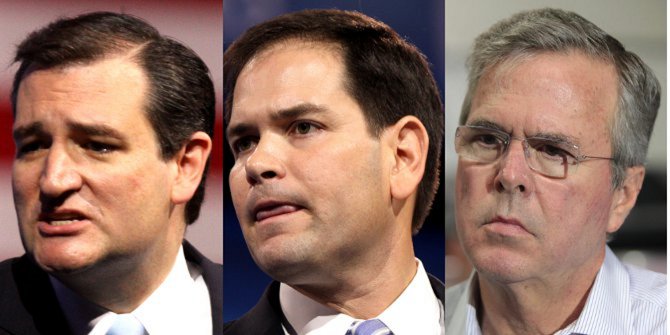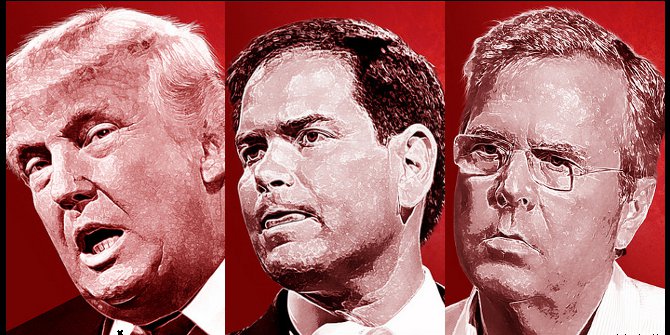 Last week, the Republican Party held its third debate in their presidential primary. Jenny Tatsak writes that the debate was characterized by successful attacks from Senator Ted Cruz on the CNBC debate moderators, and an effective defense from Senator Marco Rubio against Governor Jeb Bush’s attacks over his missed Senate votes.
Last week, the Republican Party held its third debate in their presidential primary. Jenny Tatsak writes that the debate was characterized by successful attacks from Senator Ted Cruz on the CNBC debate moderators, and an effective defense from Senator Marco Rubio against Governor Jeb Bush’s attacks over his missed Senate votes.
The GOP presidential hopefuls debated for the third time last Thursday. With the Iowa caucuses less than 100 days away, viewers watched a much different debate than the two previous matchups. Instead of attacking each other, the candidates united against the CNBC moderators and the media. Despite individual wins and losses, the CNBC moderators, and by default the media, were the casualties of this GOP showdown.
The functional theory of political campaign discourse identifies debates as the source of the information viewers use to conduct a cost-benefit analysis of each candidate’s preferability. This theory is uniquely matched with CNBC’s focus on finance. The functional theory of campaign discourse identifies three functions campaigns utilize to demonstrate preferability: acclaim, attack, and defense.
Acclaim
Acclaims are the most common function in campaign rhetoric. Candidates unabashedly tout their accomplishments to the electorate as evidence of future job performance. Donald Trump, the bombastic acclaimer of previous debates, offered calmer explanations of his business leadership to demonstrate his fitness to lead the country. Recently, Trump suffered a drop in the polls while the opponent he criticized as “low energy,” Dr. Ben Carson, has surging poll numbers. This new succinct, on message, and less theatrical Donald Trump may silence the Republican base questioning his ability to act “presidential.”
Attack
Attacks can have a negative effect on candidates. The electorate does not generally favor unrelenting attacks. Texas Senator Ted Cruz fired the warning shot aimed at the night’s common enemy. “The questions asked in this debate illustrate why the American people don’t trust the media,” criticized Cruz. Fueled by the cheering crowd and his smiling opponents, Cruz launched an all-out assault on the CNBC moderators. “Everyone home tonight knows that the moderators have no intention of voting in a Republican primary,” argued Cruz. “This is not a cage match. And you look at the questions — Donald Trump, are you a comic book villain? Ben Carson, can you do math? John Kasich, will you insult two people over here? Marco Rubio, why don’t you resign? Jeb Bush, why have your numbers fallen? How about talking about the substantive issues.”
New Jersey Governor Chris Christie joined in the attacks with two striking blows to the CNBC moderators. In response to the moderator’s interruption, Christie asserted, “Even in New Jersey, what you are doing is called rude.” Aghast over a question about regulating fantasy football, Christie lambasted the moderators. “Are we really talking about getting the government involved in fantasy football? Wait a second. We have $19 trillion in debt. We have people out of work. We have ISIS and al Qaeda attacking us. And we’re talking about fantasy football!”
The attacks were not limited to the moderators. Former Florida Governor Jeb Bush experienced the backlash from his attack on his protégé, Florida Senator Marco Rubio. Recent campaign staff layoffs and slashed salaries signaled trouble in the Bush campaign. The stakes were perhaps the highest for Bush, who needed a strong showing, to reassure contributors of his viability as a candidate with staying power. Sen. Marco Rubio surpassed Bush’s poll numbers placing him in the crosshairs of an attack. As a “constituent,” Bush expressed concern about Rubio’s missed Senate votes. “He’s a gifted politician. But Marco, when you signed up for this, this was a six-year term. And you should be showing up to work. I mean, literally, the Senate — what is it, like a French work week? You get like three days where you have to show up?”

Credit: Gage Skidmore (Flickr, CC-BY-SA-2.0)
While attacks can prove effective in swaying the electorate by exposing wrongdoing or vulnerabilities, the Bush-Rubio showdown demonstrates the backlash that may boomerang to damage the attacker. The attack against Rubio, by his one-time mentor, seemed particularly mean-spirited in light of their history and Bush’s otherwise low-key communication style, but most pronounced because of the collegiality between the other candidates characterizing this third debate. A victim must defend against the attacker. For Marco Rubio, his defense scored him a win and Jeb Bush a loss.
Defense
While defenses are inevitable in debates when past performance is questioned, candidates may remind or draw attention to weaknesses in these responses to attacks. All the candidates were forced to defend their record, including Carly Fiorina’s Hewlett-Packard firing, Trump’s bankruptcies, and Carson’s endorsement of a dietary supplement. The difference between these defenses, and Marco Rubio’s defense against the Jeb Bush attack, is the other attacks were launched by the common enemy, the CNBC moderators.
“The only reason why you’re doing it now is because we’re running for the same position, and someone has convinced you that attacking me is going to help you,” claimed Rubio. “I’m not — my campaign is going to be about the future of America, it’s not going to be about attacking anyone else on this stage. I will continue to have tremendous admiration and respect for Governor Bush. I’m not running against Governor Bush, I’m not running against anyone on this stage. I’m running for president because there is no way we can elect Hillary Clinton to continue the policies of Barack Obama.” Bush’s attack provided Rubio the opportunity to appear presidential, while at the same time minimizing the criticisms levied by Bush and the moderators.
The third debate had many winners. Trump won by avoiding the tangents and character assaults plaguing past debate performances and his campaign in general. Cruz won by identifying the common enemy in the CNBC moderators. He cast the moderators in a negative light and heaped praise on his opponents, which united the candidates against a common enemy. This common enemy led to civility among the candidates. Rubio won by fending off his attackers. This win is significant because it was achieved in spite of significant liabilities, including his Senate voting record and personal finances, which could have caused catastrophic damage to his campaign. Instead, Rubio used his defense to convey the poise and confidence befitting the president.
While Jeb Bush lost because of the backlash from his attack against Rubio, the third debate’s biggest loser was CNBC, and by association, the media. As the primary elections near and the race heats up, the acclaim, attacks, and defenses of these GOP presidential hopefuls will score the ultimate win, the GOP nomination.
Please read our comments policy before commenting.
Note: This article gives the views of the author, and not the position of USAPP– American Politics and Policy, nor of the London School of Economics, or Walsh College.
Shortened URL for this post: http://bit.ly/1Oocahz
_________________________________
 Jenny Tatsak – Walsh College
Jenny Tatsak – Walsh College
Jenny Tatsak is a Professor of Business Communication at Walsh College. Her fields of interest include persuasive campaigns and strategic communication. She worked in a number of capacities on political statewide, regional, and national campaigns, including campaign manager and primary spokesperson.




